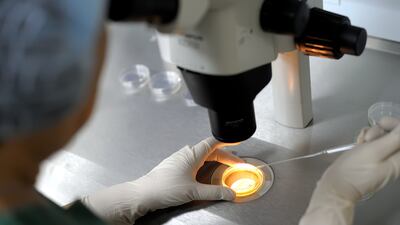Researchers have developed a new technique that will allow parents to pick the sex of their child during IVF treatment, prompting calls for regulation of the practice.
The process, developed in the US, enables scientists to choose sperm that boosts the odds of conceiving specifically a boy or girl to about 80 per cent.
Concerns have been raised in the UK about the wider implications of providing a “legal loophole” that will allow couples to choose the sex of their children.
Writing in the journal PLOS One, the researchers from Cornell University in New York state say there is a role for the technology for parents who want to avoid passing genetic disorders linked to gender, such as haemophilia in males and Rett Syndrome in females.
“If the disease itself is X-linked, there is a need to determine the embryo sex to avoid transmission of an affected male embryo,” they wrote.
But they admit the process may raise “ethical concerns”.
The scientists selected sperm based on whether they contained an X chromosome, which would make female offspring, or a Y, which creates male offspring, using measures to determine density.
Sperm containing X chromosomes is slightly heavier, because it contains more genetic material, making each type easy to identify and separate.
Using the technique, 59 couples who wanted girls had produced 79 per cent female embryos, resulting in the birth of 16 females. Another 46 couples who wanted boys produced 75 per cent male embryos, leading to the birth of 13 baby boys.
The researchers wrote: “Although ethically debatable, expressing a sex preference for offspring is popular among couples, and not limited to those undergoing infertility treatment,” although the stressed that the "sex-selection method does not necessarily guarantee offspring of a specific sex".
The technique enabling the selection of embryos for the desired sex is “extremely safe as well as efficient, inexpensive and ethically palatable”, they added.
It is possible to use technology to choose the gender of a child in the US but the practice is banned in the UK unless there is a medical reason for it, such as a risk of passing on a sex-based condition.
Fertility problems - in pictures
Dr Channa Jayasena, head of andrology at Imperial College London, said: “Their technical achievement is insignificant compared to the serious ethical concerns raised by the research.
“They propose sperm selection as an ‘ethical’ alternative to embryo selection. I find this incredible, since sperm selection is just another way of selecting embryos to manipulate the sex of offspring, with detrimental societal implications.
“I am alarmed that such technology might become more widespread in clinical practice. This research therefore raises serious ethical concerns which need to be addressed urgently through regulation.”
Polling shows the British public is opposed to sex selection, with 57 per cent of people against the practice and 28 per cent in favour.
Some NHS trusts refuse to tell couples the sex of their baby.






